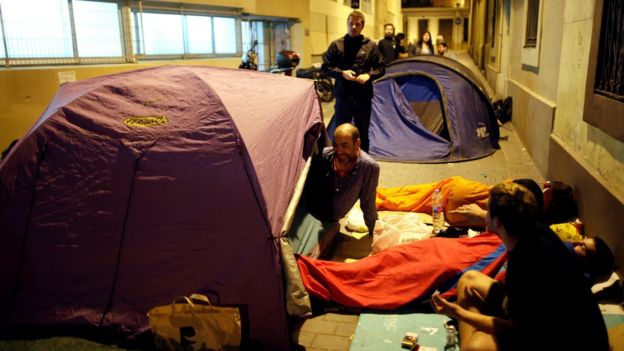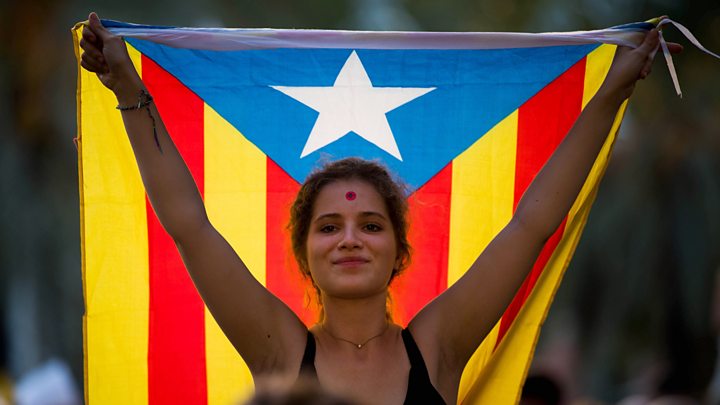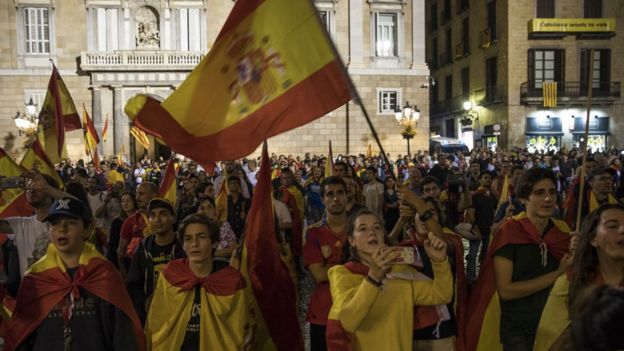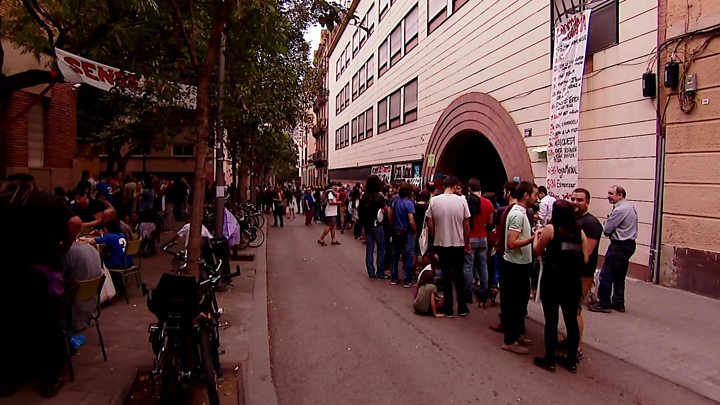Tense crowds have formed outside polling stations in Catalonia ahead of an independence referendum banned by the Spanish government.
Regional officials said ballot boxes were ready and predicted a big turnout.
The Madrid government has pledged to stop the vote and dozens of police vehicles have left their base in the port of the regional capital Barcelona.
Overnight, thousands of separatist supporters occupied the schools that were to be used as voting centres.
Police say they will be evicted.
Referendum organisers had urged voters to turn up "to defend" the polling stations at 05:00 (03:00 GMT) and to wait for voting to start at 09:00. They called for peaceful resistance to any police action.
"I have got up early because my country needs me," said Eulalia Espinal I Tarro, 65, who was outside a Barcelona school.
"We don't know what is going to happen but we have to be here."
Sunday would be an "important date for democracy", regional Vice-President Oriol Junqueras told TV3, the main Catalan public channel.
"We have overcome many obstacles, there's nothing that we cannot rise above," he added. "If we don't defend our own rights then who will?"
 REUTERS
REUTERS
The ballot papers contain just one question: "Do you want Catalonia to become an independent state in the form of a republic?" There are two boxes: Yes or No.
The referendum has been declared illegal by Spain's constitutional court and thousands of extra police have been sent to the region. Many of the extra officers are stationed in two ships in the port of Barcelona.
 GETTY IMAGES
GETTY IMAGES
On the eve of the vote, thousands of demonstrators calling for Spanish unity held rallies in cities across Spain, including in the Catalan capital, Barcelona.
They waved Spanish flags and carried banners reading "Catalonia is Spain".
The Madrid government has put policing in Catalonia under central control and ordered the regional force, the Mossos d'Esquadra, to help enforce the ban.
In a show of force, Spanish authorities have seized voting materials, imposed fines on top Catalan officials and temporarily detained dozens of politicians.
Police have also occupied the regional government's telecommunications centre.
Spanish government sources quoted by Reuters said police would decide for themselves how to enforce orders to stop people voting on Sunday. The head of the Catalan police has urged officers to avoid using force.
Many of those inside the schools are parents and their children who remained in the buildings after the end of lessons on Friday. Many brought sleeping bags and bedded down on gym mats.

"We don't understand why we can't express in a peaceful manner the simplest expression of democracy - a vote," said Pablo Larranaga, at a Barcelona school on Saturday evening.
"We don't know what is going to happen tomorrow. We are going to try to vote in the only way we know, which is peacefully."
Catalonia is a wealthy region of 7.5 million people in north-eastern Spain with its own language and culture.
It has a high degree of autonomy but is not recognised as a separate nation under the Spanish constitution.
Pressure for a vote on self-determination has grown in recent years. Spanish unionists argue Catalonia already enjoys broad autonomy within Spain, along with other regions like the Basque Country and Galicia.
